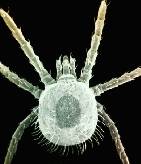
FRIDAY, Nov. 9 (HealthDay News) — New research adds to a growing body of evidence that suggests certain tick bites may cause even the most seasoned of carnivores to develop an allergy to red meat.
Here’s how it works in humans, experts say: The Lone Star tick, which is found largely in central and southern U.S. regions, injects spit into your body when it bites you. When this occurs, your body develops antibodies to a carbohydrate in the tick’s spit that is known as alpha-gal, a carbohydrate that is also present in red meat. The person then eats meat, and an allergic reaction is triggered.
This reaction tends to occur within three to six hours after eating meat, and can range in severity from mild hives and itching to full-blown anaphylactic shock (a potentially deadly reaction).
The new study found that positive alpha-gal rates are actually 32 percent higher in states where the Lone Star tick is known to lurk, compared with other parts of the country. That said, there were higher than expected rates of alpha-gal positivity even in states where the Lone Star tick is not usually seen, the investigators noted.
The findings are to be presented Friday at the American College of Allergy, Asthma and Immunology (ACAAI) annual meeting, in Anaheim, Calif.
This red meat-tick connection was first discovered when researchers were trying to determine why a certain cancer drug was causing severe allergic reactions in people in the southern states. As it turns out, the sugars in that drug are also present in beef, pork and cow’s milk.
“It’s called molecular mimicry, and it is fascinating,” said Dr. Bruce Hirsch, an infectious diseases specialist at North Shore University Hospital in Manhasset, N.Y. “This new study substantiates the frequency of this risk.”
Climate change may also mean that Lone Star ticks will start appearing in other regions, so the findings “emphasize the importance of preventing tick bites,” Hirsch said.
ACAAI president Dr. Stanley Fineman called the tick-meat allergy reaction “unusual.”
“It is an immune response to saliva of the tick that they leave behind when they bite, and this study really shows a higher prevalence of positive reactions in areas of the country that are endemic to the Lone Star tick,” he said. “It is a bigger problem than we probably realized.”
The reaction can occur up to six hours after the person eats the red meat. “Symptoms include hives, or itching in the mouth and swelling in the throat that occur after eating a hamburger [for example],” Fineman explained.
How can you know for sure? “Be a detective,” Fineman said. “If you get hives, figure out what you ate just before and if it was a meal with beef, lamb or pork, you should probably check with an allergist, especially if you like to go outside” in areas commonly inhabited by ticks.
Research presented at medical meetings should be viewed as preliminary until published in a peer-reviewed journal.
More information
Learn how to avoid ticks at the U.S. Centers for Disease Control and Prevention.

